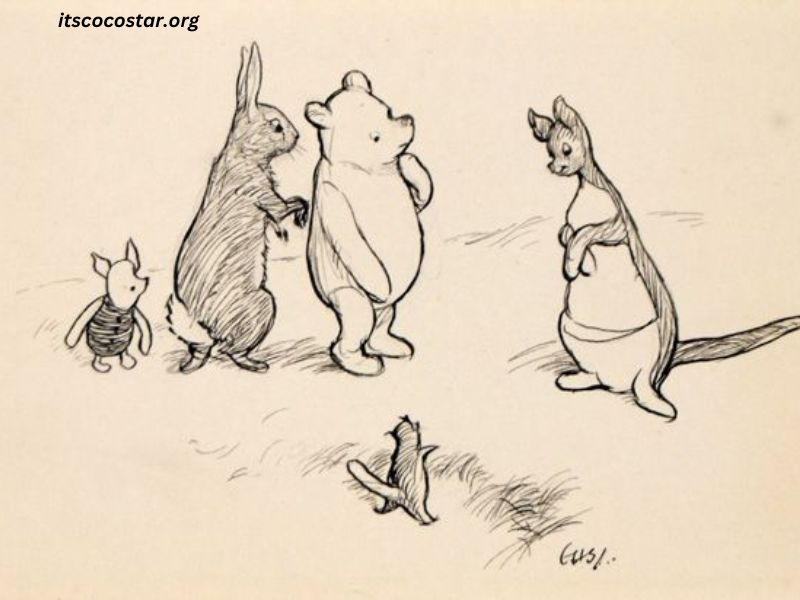The phrase “I am a bear of very little brain” is one that resonates with many people, evoking a sense of innocence, simplicity, and humility. But who first said it, and why has this quote endured in literature, popular culture, and in the hearts of readers across generations? The line is closely associated with one of the most beloved characters in children’s literature: Winnie the Pooh. In this article, we’ll explore the origins of this quote, its context within the story, its deeper meaning, and why it has continued to captivate audiences for decades.
The Origins of the Quote
The line “I am a bear of very little brain” originates from Winnie-the-Pooh, a book written by A.A. Milne and first published in 1926. Winnie-the-Pooh, often referred to simply as Pooh, is a lovable bear who lives in the Hundred Acre Wood along with his friends, including Piglet, Tigger, Rabbit, Eeyore, and Christopher Robin. In the book, Pooh is portrayed as simple-minded, kind-hearted, and always eager for honey, yet he has a unique way of understanding the world around him.
This particular line comes from a moment when Pooh, in his endearing and often absent-minded way, reflects on his own intellect. The phrase appears in Chapter 3 of Winnie-the-Pooh, when Pooh is preparing to visit Rabbit. In an attempt to make a plan, Pooh humbly admits, “I am a bear of very little brain,” acknowledging his perceived shortcomings while still embarking on an adventure. The line exemplifies Pooh’s self-awareness of his own limitations, but also his unshakable optimism and willingness to engage with the world.
Context Within the Story
To better understand why Pooh says “I am a bear of very little brain,” let’s delve into the scene in which the quote occurs. In Chapter 3, titled “In Which a House Is Built at Pooh Corner for Eeyore,” Pooh finds himself in a predicament. He wants to visit his friend Rabbit, but he’s unsure about how to make the trip, given that he’s not exactly the most intellectually sharp character in the Hundred Acre Wood. Pooh’s self-reflection, expressed through this line, adds to his charm. He doesn’t shy away from admitting that he’s not the brightest bear, yet he approaches the task with a heart full of determination and a generous spirit.
When Pooh admits that he has “very little brain,” he isn’t necessarily demeaning himself. Instead, he’s acknowledging the simplicity of his thoughts. Pooh’s intelligence may not be academic, but his wisdom lies in his capacity for empathy, kindness, and an understanding of the simple joys of life. He doesn’t overthink things, which often leads to delightful moments of clarity for both himself and those around him.
The Deeper Meaning Behind the Quote
While at first glance, Pooh’s statement about his “little brain” may seem like a mere confession of his lack of intelligence, it carries a deeper meaning about humility and acceptance of oneself. Pooh’s admission reflects an important life lesson: that wisdom doesn’t always come from academic learning or intellectual pursuits. Sometimes, the greatest knowledge comes from living with an open heart and accepting who we are, flaws and all.
In a world where intelligence is often measured by academic success, professional achievements, and complex problem-solving skills, Pooh’s simplicity offers a refreshing perspective. His brain may be “very little,” but his understanding of love, friendship, and kindness is profound. In his innocence, Pooh demonstrates that emotional intelligence, empathy, and compassion are just as valuable—if not more so—than intellectual prowess. Pooh’s self-awareness and humility resonate with both children and adults who may feel the pressure of societal expectations regarding intelligence and achievement.
The quote also speaks to the importance of being true to oneself. Pooh doesn’t pretend to be someone he’s not. He doesn’t try to be clever or overly strategic. Instead, he embraces his simplicity and leads a life full of love and contentment. This acceptance of one’s limitations, coupled with a willingness to embrace the world with an open heart, is a message that has transcended generations and remains deeply relevant today.
Winnie the Pooh’s Enduring Popularity
Since the publication of Winnie-the-Pooh in 1926, the character of Pooh has become an icon in children’s literature. A.A. Milne’s stories of the bear and his friends in the Hundred Acre Wood have captured the hearts of readers of all ages. The books have been translated into numerous languages, adapted into movies, television shows, and stage productions, and have left an indelible mark on popular culture.
The character of Winnie the Pooh embodies qualities that are universally loved: innocence, kindness, and an unwavering sense of friendship. His adventures, often humorous yet insightful, highlight the value of simple pleasures and the importance of companionship. Through his interactions with his friends, Pooh teaches readers timeless lessons about loyalty, generosity, and the importance of slowing down to appreciate life’s small joys.
The phrase “I am a bear of very little brain” has become synonymous with Pooh’s personality. It encapsulates his endearing humility and lack of pretense. Over the years, this quote has been shared in various forms of media, from merchandise to social media posts, and it remains one of the most recognizable lines associated with the character.
Why the Quote Resonates with People
So, why has the line “I am a bear of very little brain” endured for nearly a century? There are several reasons why this quote continues to resonate with people of all ages:
- Humility and Self-Acceptance: In a world where many are taught to strive for success, intelligence, and recognition, Pooh’s simple admission of his “little brain” is a refreshing reminder of the power of humility and self-acceptance. It encourages people to be comfortable in their own skin, without feeling the need to conform to external expectations.
- Simplicity in a Complex World: The quote speaks to the power of simplicity. In today’s fast-paced, high-pressure society, it’s easy to feel overwhelmed by complexity. Pooh, in his gentle simplicity, shows us that sometimes the best way to navigate life is through kindness, patience, and a willingness to enjoy the small, simple moments.
- Emotional Intelligence: Pooh’s wisdom lies not in his intellectual abilities, but in his emotional intelligence. He understands the importance of his friendships, the value of sharing, and the joy of caring for others. The quote reminds us that emotional understanding is just as valuable as intellectual knowledge.
- Timeless Appeal: The line also resonates because of Pooh’s timeless nature. Generations of children have grown up reading Winnie-the-Pooh, and the story continues to speak to young readers as well as adults. Pooh’s self-awareness and willingness to be imperfect make him a relatable figure, no matter one’s age.
The Legacy of Pooh’s Quote
Winnie the Pooh’s quote, “I am a bear of very little brain,” is more than just a charming line from a children’s book. It encapsulates the essence of the character and carries a timeless message of humility, simplicity, and emotional wisdom. The quote encourages readers to embrace their imperfections, focus on what truly matters in life, and remember that wisdom doesn’t always come from intellect but from the heart.
Over the decades, this quote has remained relevant, inspiring countless individuals to reflect on the importance of self-acceptance and the joy of living a life full of kindness and simplicity. It serves as a reminder that, despite our perceived shortcomings, we all have something valuable to offer to the world.
In a world that often celebrates complexity and achievement, Pooh’s “little brain” reminds us that sometimes, the most profound insights come from the simplest places. So, the next time you face a challenge or feel overwhelmed by the demands of life, remember the humble words of Pooh: “I am a bear of very little brain.” Embrace the simplicity of life and the wisdom that comes with it.







